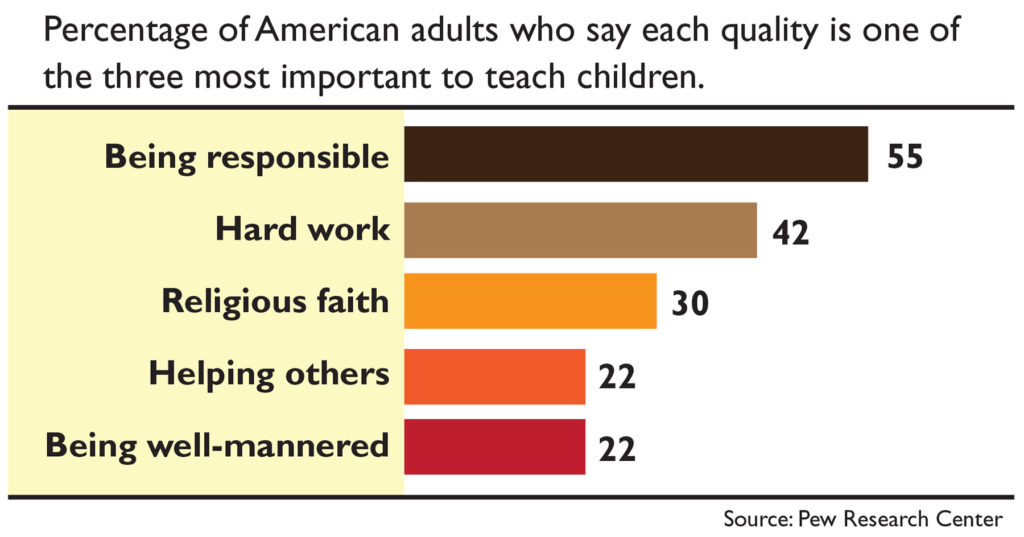by Aaron Earls
Americans want their kids to be responsible, hard working and maybe just a little religious.
When Pew Research asked American adults what qualities they believe are one of the three most important to pass down to children, most Americans (55 percent) say being responsible. More than 40 percent say hard work, while 30 percent say religious faith.
Both helping others and being well-mannered garnered support from 22 percent of Americans.
There was a significant ideological divide over the importance of religion.
Only 11 percent of those whom Pew classifies as consistently liberal say religious faith is one of the three most important things to pass on to children, while almost 60 percent of those who are consistently conservative place faith among their top three.
Similarly, age played an important factor in whether or not people saw religion as one of the most important values. The younger a person was the less likely they were to view faith as important.
There were also significant racial and ethnic differences. African Americans were much more likely than whites or Hispanics to say religion is one of the most important values. Forty-one percent of black adults, compared to 30 percent of whites and 26 percent of Hispanics, say faith is most important.
A much smaller gap exists between genders with 32 percent of women and 28 percent of men saying religion is most important.
The numbers are not much better even when looking at those who are religious. While evangelical Protestants were most likely to say passing on religious faith is one of the most important things a parent can do, it still added up to only 60 percent who say so. Only 28 percent of Catholic and 22 percent of white mainline Protestants placed religious faith as one of their most important values.
The next generation has picked up on the elevation of hard work and good morals and the relative downplaying of religious values.
In 2005, sociologists Christian Smith and Melinda Lundquist Denton published Soul Searching: The Religious and Spiritual Lives of American Teenagers, which claimed the actual default religion of students is “Moralistic Therapeutic Deism.”
The basic tenants of this belief system are:
- A god exists who created and ordered the world and watches over human life on earth.
- God wants people to be good, nice, and fair to each other, as taught in the Bible and by most world religions.
- The central goal of life is to be happy and to feel good about oneself.
- God does not need to be particularly involved in one’s life except when God is needed to resolve a problem.
- Good people go to heaven when they die.
Many see a major conflict between this approach to religion and the gospel as presented by Christ and the Bible.
Alvin Reid, author of Raising the Bar: Ministry to Youth in the New Millennium and professor of student ministry at Southeastern Baptist Theological Seminary, wrote that the emphasis placed on morality will backfire on parents and churches.
It is ironically a “moral failure,” for by focusing on morality too much we actually hinder students from seeing the lifelong, holistic implications of their faith. Motivation for serving God stems more from changing our behavior than from living a life of radical faith. Such extrinsic motivation will actually work on the short term: show students how sex before marriage will lead to guilt and disease, for instance, or show them how lying will cost them friendships, and they will abstain from these sins, at least for a season. But if moral change becomes the primary focus of our faith, the long-term obedience we seek may actually be the one thing we will not see.
Summit Church pastor and author of Gospel: Recovering the Power That Made Christianity Revolutionary J.D. Greear told Trevin Wax, managing editor of The Gospel Project, that appealing to morality is using the wrong tools to help students.
“You end up with the fear of addiction or the fear of a sexually transmitted disease as kind of your ace in the hole trying to get them to do what you want them to do,” he said.
Instead of morality, Greear says “the gospel is the transforming work of God in the heart.”
But, according to Pew’s research, it would seem only 30 percent of American parents agree.
Aaron Earls (@WardrobeDoor) is online editor of Facts & Trends.







